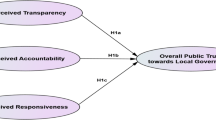Abstract
In a classical social choice framework, this paper presents two formulations of the notion of corruption and examines their consequences for decision making in an organization. It is shown that any organization is corruptible if a minimal concept of corruption is used to diagnose corruptibility; however, if a more demanding concept of corruption is applied, there are organizations that are immune to such stronger forms of corruption. There are no constitutionally incorruptible organizational forms but weakly incorruptible constitutions can exist.
Similar content being viewed by others
Data availability
Not applicable.
Code availability
Not applicable.
Notes
See Ostrom (1990).
To focus on our problem at hand, we use a simplest possible framework by assuming that each individual has a strict linear ordering over \(X\).
In the social choice literature, the function \(C\) is often referred to as a social choice function or rule. We use the selection function here to accommodate a wider range of choice problems than the problem implied by a social choice function.
References
Aidt, T. S. (2003). Economic analysis of corruption: a survey. The Economic Journal, 113, F632-52.
Barbera, S. (2011). Strategy-proofness. In K. Arrow, A. K. Sen, & K. Suzumura (Eds.), Handbook of social choice and welfare. (Vol. 2, Chap. 25). North Holland.
Gibbard, A. (1973). Manipulation of voting schemes: a general result. Econometrica, 41, 587–602.
Jain, A. K. (2001). Corruption: a review. Journal of Economic Surveys, 15(1), 71–121.
Ostrom, E. (1990). Governing the Commons. Cambridge University Press
Pattanaik, P. K. (1973). On the stability of sincere voting situations. Journal of Economic Theory, 6, 558–574.
Ritz, Z. (1983). Restricted domains, arrow social welfare functions and noncorruptible and nonmanipulable social choice correspondence: the case of private alternatives. Mathematical Social Sciences, 4, 155–179.
Ritz, Z. (1985). Restricted domains, arrow social welfare functions and noncorruptible and nonmanipulable social choice correspondence: the case of private and public alternatives. Journal of Economic Theory, 35, 1–18.
Satterthwaite, M. A. (1975). Strategy-proofness and arrow’s conditions: existence and correspondence theorems for voting procedures and social welfare functions. Journal of Economic Theory, 10, 187–217.
Satterthwaite, M. A., & Sonnenschein, H. (1981). Strategy-proof allocation mechanisms at differentiable points. Review of Economic Studies, 53, 587–597.
Shleifer, A., & Vishny, R. W. (1993). Corruption. Quarterly Journal of Economics, 108, 599–618.
Acknowledgements
We are grateful to Koichi Tadenuma for helpful conversations, and to Herve Moulin and Prasanta K. Pattanaik for helpful comments on an earlier version of the paper. Two anonymous reviewers have given us very helpful comments and suggestions for which we highly appreciate. We are particularly thankful to Reviewer 1 for very detailed and constructive advices on the exposition. Needless to say, all the remaining errors are our own.
Funding
Not applicable.
Author information
Authors and Affiliations
Corresponding author
Ethics declarations
Conflict of interest
On behalf of all authors, the corresponding author states that there is no conflict of interest.
Additional information
Publisher’s Note
Springer Nature remains neutral with regard to jurisdictional claims in published maps and institutional affiliations.
Rights and permissions
About this article
Cite this article
Tang, FF., Xu, Y. Corruption in Organizations: Some General Formulations and (In-)Corruptibility Results. Homo Oecon 38, 49–57 (2021). https://doi.org/10.1007/s41412-021-00112-5
Received:
Accepted:
Published:
Issue Date:
DOI: https://doi.org/10.1007/s41412-021-00112-5




